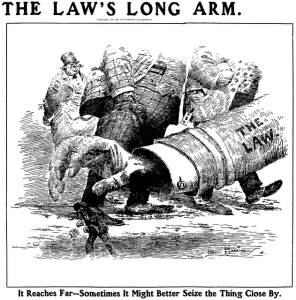 In Wills v. Arizon Structures, the parties disputed whether a Missouri judgment about arbitrability precluded a later motion to compel arbitration. The petitioners had been involved in the Missouri proceedings but obtained dismissal for lack of personal jurisdiction. The Fifth Circuit found that the judgment entered in Missouri against the business that employed them did not create a collateral estoppel bar. Privity, for purposes of claim or issue preclusion, does not ordinarily arise “based solely on an employment or corporate relationship.” And “[a] shared interest in compelling arbitration, by itself, does not warrant the conclusion that the parties are in privity such that the judgment denying [Employer’s] motion to compel arbitration binds Employees.” No. 15-41166 (May 27, 2016).
In Wills v. Arizon Structures, the parties disputed whether a Missouri judgment about arbitrability precluded a later motion to compel arbitration. The petitioners had been involved in the Missouri proceedings but obtained dismissal for lack of personal jurisdiction. The Fifth Circuit found that the judgment entered in Missouri against the business that employed them did not create a collateral estoppel bar. Privity, for purposes of claim or issue preclusion, does not ordinarily arise “based solely on an employment or corporate relationship.” And “[a] shared interest in compelling arbitration, by itself, does not warrant the conclusion that the parties are in privity such that the judgment denying [Employer’s] motion to compel arbitration binds Employees.” No. 15-41166 (May 27, 2016).
Monthly Archives: May 2016
I recently published an article, titled “Convergence of Federal Rules 8(A) and 9(B) – The Fifth Circuit’s Application of Twombly and Iqbal” in the Southern University Law Review.
 After Hall Street Associates LLC v. Mattel, Inc., 552 U.S. 576 (2008), the Fifth Circuit concluded that “manifest disregard of the law” was no longer available as a nonstatutory ground for vacatur of an arbitration award under the FAA. Since then, other circuits have considered whether “manifest disregard” can be a statutory basis for vacatur. In McKool Smith PC v. Curtis Int’l, the losing party in an attorneys fee dispute
After Hall Street Associates LLC v. Mattel, Inc., 552 U.S. 576 (2008), the Fifth Circuit concluded that “manifest disregard of the law” was no longer available as a nonstatutory ground for vacatur of an arbitration award under the FAA. Since then, other circuits have considered whether “manifest disregard” can be a statutory basis for vacatur. In McKool Smith PC v. Curtis Int’l, the losing party in an attorneys fee dispute  mounted such a challenge to the arbitrator’s award in favor of the firm, but the Court sidestepped the issue, finding support for the arbitrator’s rulings in the applicable Texas case law. No. 15-11140 (May 23, 2016, unpublished) (Almost simultaneously, the Texas Supreme Court rejected the “statutory basis” argument in Hoskins v. Hoskins, No. 15-0046 (May 20, 2016)).
mounted such a challenge to the arbitrator’s award in favor of the firm, but the Court sidestepped the issue, finding support for the arbitrator’s rulings in the applicable Texas case law. No. 15-11140 (May 23, 2016, unpublished) (Almost simultaneously, the Texas Supreme Court rejected the “statutory basis” argument in Hoskins v. Hoskins, No. 15-0046 (May 20, 2016)).
 Ronald Crose, an overly enthusiastic raver, took ecstasy and suffered a stroke not long after. A suit on his health insurance policy followed; at issue was an exclusion for “[l]oss due to being . . . under the influence of any narcotic.” The Fifth Circuit agreed that ecstasy was a “narcotic” within the meaning of the exclusion, rejecting as overly technical the argument that “narcotic” refers only to “drugs derived from a plant” (as opposed to a “hallucinogen” such as ectasy). The Court went on to find that under applicable Texas law, “due to” required more than “but for” causation, but did not require proof that the narcotic was the sole cause of injury. Crose v. Humana Ins. Co., No. 15-50559 (May 23, 2016).
Ronald Crose, an overly enthusiastic raver, took ecstasy and suffered a stroke not long after. A suit on his health insurance policy followed; at issue was an exclusion for “[l]oss due to being . . . under the influence of any narcotic.” The Fifth Circuit agreed that ecstasy was a “narcotic” within the meaning of the exclusion, rejecting as overly technical the argument that “narcotic” refers only to “drugs derived from a plant” (as opposed to a “hallucinogen” such as ectasy). The Court went on to find that under applicable Texas law, “due to” required more than “but for” causation, but did not require proof that the narcotic was the sole cause of injury. Crose v. Humana Ins. Co., No. 15-50559 (May 23, 2016).
 Building on Wooten v. McDonald Transit Associates, Inc., 788 F.3d 490 (5th Cir. 2015), the Fifth Circuit found that a pro se plaintiff had adequately pleaded an ADEA claim in Haskett v. T.S. Dudley Land Co., No. 14-41459 (May 20, 2016, unpublished). Haskett attached his employer’s response to his EEOC charge as an exhibit to his complaint, and the employer argued that the statements in that response negated Haskett’s claim. The Court disagreed: “Haskett clearly did not adopt [his employer’s] allegations to the EEOC as his own for purposes of his complaint. They are therefore still ‘unilateral’ and to the extent they are in tension with the complaint itself, they cannot control.” (citing Bosarge v. Mississippi Bureau of Narcotics, 796 F.3d 435, 440 (5th Cir. 2015)).
Building on Wooten v. McDonald Transit Associates, Inc., 788 F.3d 490 (5th Cir. 2015), the Fifth Circuit found that a pro se plaintiff had adequately pleaded an ADEA claim in Haskett v. T.S. Dudley Land Co., No. 14-41459 (May 20, 2016, unpublished). Haskett attached his employer’s response to his EEOC charge as an exhibit to his complaint, and the employer argued that the statements in that response negated Haskett’s claim. The Court disagreed: “Haskett clearly did not adopt [his employer’s] allegations to the EEOC as his own for purposes of his complaint. They are therefore still ‘unilateral’ and to the extent they are in tension with the complaint itself, they cannot control.” (citing Bosarge v. Mississippi Bureau of Narcotics, 796 F.3d 435, 440 (5th Cir. 2015)).
 Presenting a textbook Erie problem, Passmore sued Baylor Regional Medical Center about his back surgeries in federal court based on bankruptcy jurisdiction. The defendants obtained dismissal on the expert report requirements in section 74.351 of the Texas Civil Practice & Remedies Code. Reviewing the requirements of that statute, the requirements of the Federal Rules of Civil Procedure governing discovery, and district court opinions on the matter, the Fifth Circuit reversed, holding: “Section 74.351’s regulation of discovery and discovery-related sanctions sets it apart from the pre-suit requirements in the cases cited by the defendants and brings it into direct collision with Rules 26 and 37.” Passmore v. Baylor Health Care System, No. 15-10358 (May 19, 2016).
Presenting a textbook Erie problem, Passmore sued Baylor Regional Medical Center about his back surgeries in federal court based on bankruptcy jurisdiction. The defendants obtained dismissal on the expert report requirements in section 74.351 of the Texas Civil Practice & Remedies Code. Reviewing the requirements of that statute, the requirements of the Federal Rules of Civil Procedure governing discovery, and district court opinions on the matter, the Fifth Circuit reversed, holding: “Section 74.351’s regulation of discovery and discovery-related sanctions sets it apart from the pre-suit requirements in the cases cited by the defendants and brings it into direct collision with Rules 26 and 37.” Passmore v. Baylor Health Care System, No. 15-10358 (May 19, 2016).
 Hazim, a resident of Kansas, sued S&D Ltd., a publisher based in the UK, about its handling of Hazim’s book. Their contract had Texas choice-of-law and forum-selection provisions. Finding that the specific terms of the forum selection provision were not dispositive, the Fifth Circuit held that under Int’l Energy Ventures Management LLC v. United Energy Group, 2016 WL 1274030 (5th Cir. March 31, 2016), Hazim did not establish personal jurisdiction: “[T]he contract was between a Kansas resident and a United Kingdom entity and contemplated performance in the United Kingdom and Kansas. Even accepting that the contract contained the Texas choice-of-law and forum selection provision (as the IVEM-UEG contract did) . . . the contract on which Hazim is suing is not sufficiently related to Texas[.]” Hazim v. Schile & Denver Book Publishers, No. 15-20586 (May 5, 2016, unpublished).
Hazim, a resident of Kansas, sued S&D Ltd., a publisher based in the UK, about its handling of Hazim’s book. Their contract had Texas choice-of-law and forum-selection provisions. Finding that the specific terms of the forum selection provision were not dispositive, the Fifth Circuit held that under Int’l Energy Ventures Management LLC v. United Energy Group, 2016 WL 1274030 (5th Cir. March 31, 2016), Hazim did not establish personal jurisdiction: “[T]he contract was between a Kansas resident and a United Kingdom entity and contemplated performance in the United Kingdom and Kansas. Even accepting that the contract contained the Texas choice-of-law and forum selection provision (as the IVEM-UEG contract did) . . . the contract on which Hazim is suing is not sufficiently related to Texas[.]” Hazim v. Schile & Denver Book Publishers, No. 15-20586 (May 5, 2016, unpublished).
 Carlson alleged injuries from the ProNeuroLight, an infrared therapy device. At trial, the defendants called a chiropractor with some experience using the device. The Fifth Circuit expressed skepticism about his qualifications, noting: “While he does make diagnoses and orders tests as part of his chiropractic and alternative medicine practice, [his] qualifications do not align with or support his challenged medical causation testimony.” The Court did not rule on that basis, however, instead finding that “a district court must . . . perform its gatekeeping function by performing some type of Daubert inquiry and by making findings about the witness’s qualifications to give expert testimony.” Here, admitting the chiropractor’s testimony without taking those steps was an abuse of discretion. The Court found harm, noting that he was the sole defense witness, that his testimony was cited in closing, and that the defendants won. Accordingly, it reversed and remanded. Carlson v. Bioremedic Therapeutic Systems, Inc., No. 14-20691 (May 16, 2016).
Carlson alleged injuries from the ProNeuroLight, an infrared therapy device. At trial, the defendants called a chiropractor with some experience using the device. The Fifth Circuit expressed skepticism about his qualifications, noting: “While he does make diagnoses and orders tests as part of his chiropractic and alternative medicine practice, [his] qualifications do not align with or support his challenged medical causation testimony.” The Court did not rule on that basis, however, instead finding that “a district court must . . . perform its gatekeeping function by performing some type of Daubert inquiry and by making findings about the witness’s qualifications to give expert testimony.” Here, admitting the chiropractor’s testimony without taking those steps was an abuse of discretion. The Court found harm, noting that he was the sole defense witness, that his testimony was cited in closing, and that the defendants won. Accordingly, it reversed and remanded. Carlson v. Bioremedic Therapeutic Systems, Inc., No. 14-20691 (May 16, 2016).
 Unsuccessfully, Plaintiff sued about the foreclosure on his home in state court in 2008, and again in federal court in 2012. The Fifth Circuit said he was “WARNED that further frivolous litigation will result in substantial sanctions under Rule 38 or this court’s inherent sanctioning power and will include monetary sanctions and restrictions on access to federal court.” Then, he filed a 60(b) motion, which he also lost, and which he also appealed. The Court dismissed his appeal as frivolous, sanctioned him $500, and barred him from future litigation about the foreclosure without leave of court. Fantroy v. First Financial Bank, No. 15-10975 (May 13, 2016, unpublished). (Some time ago, I
Unsuccessfully, Plaintiff sued about the foreclosure on his home in state court in 2008, and again in federal court in 2012. The Fifth Circuit said he was “WARNED that further frivolous litigation will result in substantial sanctions under Rule 38 or this court’s inherent sanctioning power and will include monetary sanctions and restrictions on access to federal court.” Then, he filed a 60(b) motion, which he also lost, and which he also appealed. The Court dismissed his appeal as frivolous, sanctioned him $500, and barred him from future litigation about the foreclosure without leave of court. Fantroy v. First Financial Bank, No. 15-10975 (May 13, 2016, unpublished). (Some time ago, I  wrote an article called “Loud Rules” with Wendy Couture about the nuances of this kind of judicial warning.)
wrote an article called “Loud Rules” with Wendy Couture about the nuances of this kind of judicial warning.)
 The district court granted the plaintiff’s motion for conditional class certification under the Fair Labor Standards Act. The defendant sought mandamus review, and the Fifth Circuit held the petition in abatement for more information: ” Although there is generally no ‘inflexible rule requiring district courts to file a written order explaining their decisions,” in this case the district court’s ‘lack of explanation makes it impossible for us to determine’ whether mandamus relief would be appropriate here.” In re Schlumberger Tech. Corp., No. 16-20267 (May 13, 2016, unpublished).
The district court granted the plaintiff’s motion for conditional class certification under the Fair Labor Standards Act. The defendant sought mandamus review, and the Fifth Circuit held the petition in abatement for more information: ” Although there is generally no ‘inflexible rule requiring district courts to file a written order explaining their decisions,” in this case the district court’s ‘lack of explanation makes it impossible for us to determine’ whether mandamus relief would be appropriate here.” In re Schlumberger Tech. Corp., No. 16-20267 (May 13, 2016, unpublished).
 In Carpenter Properties Inc. v. JP Morgan Chase Bank, the Fifth Circuit found that a contract had been modified notwithstanding a signature on a formal counteroffer, but then found no liability under a “corporate veil” theory as to Chase: “[M]ere frustration with Chase for its failure to pay a commission once Chase’s identity was known is insufficient to amount to frustration of contractual expectations regarding the party to whom Carpenter looked for performance . . . .” No. 15-60309 (May 4, 2016, unpublished).
In Carpenter Properties Inc. v. JP Morgan Chase Bank, the Fifth Circuit found that a contract had been modified notwithstanding a signature on a formal counteroffer, but then found no liability under a “corporate veil” theory as to Chase: “[M]ere frustration with Chase for its failure to pay a commission once Chase’s identity was known is insufficient to amount to frustration of contractual expectations regarding the party to whom Carpenter looked for performance . . . .” No. 15-60309 (May 4, 2016, unpublished).
 The plaintiff in Watson v. City of Allen sued, in Texas state court, several Texas cities about the operation of their “red light camera” programs.No. 15-10732 (May 5, 2016). The cities removed based on his RICO claim and CAFA. Plaintiff then dropped the RICO claim and sought remand based on CAFA’s “local controversy” and “home state” exceptions. The district court kept the case, finding it untimely as to CAFA, finding supplemental jurisdiction over the remaining state-law claims, and dismissing many claims for lack of standing. The Fifth Circuit reversed, concluding:
The plaintiff in Watson v. City of Allen sued, in Texas state court, several Texas cities about the operation of their “red light camera” programs.No. 15-10732 (May 5, 2016). The cities removed based on his RICO claim and CAFA. Plaintiff then dropped the RICO claim and sought remand based on CAFA’s “local controversy” and “home state” exceptions. The district court kept the case, finding it untimely as to CAFA, finding supplemental jurisdiction over the remaining state-law claims, and dismissing many claims for lack of standing. The Fifth Circuit reversed, concluding:
- The 30-day deadline in 28 U.S.C. § 1447(c) does not apply to CAFA mandatory abstention provisions, since it “does not deprive federal courts of subject matter jurisdiction, but rather, acts as a limitation upon the exercise of jurisdiction granted by CAFA.”
- The CAFA motion was filed within a reasonable time of removal, when “[a]ll indications are that [Plaintiff] acted diligently to gather evidence,” and because “fifty-two days is simply not a very long time.”
 The “home state” exception applied because “[t]his suit’s primary thrust is an attempt to declare unconstitutional red light camera scheme,” meaning that the State of Texas and its municipalities were the “primary defendants,” and not the companies hired to carry out the program.
The “home state” exception applied because “[t]his suit’s primary thrust is an attempt to declare unconstitutional red light camera scheme,” meaning that the State of Texas and its municipalities were the “primary defendants,” and not the companies hired to carry out the program.- The district court should have declined to exercise supplemental jurisdiction, since “Texas courts have a strong interest” in the remaining issues and the plaintiff’s “motion to amend . . . to delete the federal claims is not a particularly egregious form of forum manipulation, if it is manipulation at all.”
The case of In re Mole involved continuing fallout from proceedings involving impeached judge Thomas Porteous. Mole was accused of hiring an attorney who “had no useful experience in the type of litigation” at hand in an attempt to have Judge Porteous recuse himself. In disciplinary proceedings before the Eastern District of Louisiana, the first judge to hear the matter declined to sanction Mole, but the full court – reviewing the same record – suspended him for a year. The Fifth Circuit found that the en banc Eastern District could rule differently from the initial judge without giving it deference, and that sufficient evidence supported the sanction — in particular, “the $100,000 severance fee in the retention letter incentivizes the prospect of a recusal.” No. 15-30647 (May 4, 2016).
 Baker sued DeShong under the Lanham Act about use of the phrase “HIV Innocence Group,” in connection with advocacy programs for individuals accused of infecting others with HIV. DeShong won and sought an award of attorneys fees. The Fifth Circuit concluded that after Octane Fitness v. Icon Health & Fitness, 134 S. Ct. 1749 (2014) (a patent case, but analogous to the similar Lanham Act provision), an award of fees to a defendant was not limited to bad faith and did not require a “clear and convincing” showing. To qualify as an “exceptional” case that justifies a fee award, the court should consider a “nonexclusive’ list of ‘factors,’ including ‘frivolousness, motivation, objective unreasonableness (both in the factual and legal components of the case) and the need in particular circumstances to advance considerations of compensation and deterrence.” Baker v. DeShong, No. 14-11157 (May 3, 2016).
Baker sued DeShong under the Lanham Act about use of the phrase “HIV Innocence Group,” in connection with advocacy programs for individuals accused of infecting others with HIV. DeShong won and sought an award of attorneys fees. The Fifth Circuit concluded that after Octane Fitness v. Icon Health & Fitness, 134 S. Ct. 1749 (2014) (a patent case, but analogous to the similar Lanham Act provision), an award of fees to a defendant was not limited to bad faith and did not require a “clear and convincing” showing. To qualify as an “exceptional” case that justifies a fee award, the court should consider a “nonexclusive’ list of ‘factors,’ including ‘frivolousness, motivation, objective unreasonableness (both in the factual and legal components of the case) and the need in particular circumstances to advance considerations of compensation and deterrence.” Baker v. DeShong, No. 14-11157 (May 3, 2016).
 Dickson guaranteed a large debt owed by Community Home Financial Services. Community went into bankruptcy, disputing the extent and validity of its obligations to its lenders. Unfortunately for Dickson, his guaranty not only waived all defenses to enforcement, and stated that it created an obligation independent of Community’s, but also said it was not changed “by the partial or complete unenforceability or invalidity” of the guaranteed obligation. He also disputed the amount owing, but the Fifth Circuit agreed that the affidavit evidence he submitted “contained only another set of allegations” and did not preclude summary judgment against him. Edwards Family Partnership LP v. Dickson, No. 15-60683 (April 29, 2016).
Dickson guaranteed a large debt owed by Community Home Financial Services. Community went into bankruptcy, disputing the extent and validity of its obligations to its lenders. Unfortunately for Dickson, his guaranty not only waived all defenses to enforcement, and stated that it created an obligation independent of Community’s, but also said it was not changed “by the partial or complete unenforceability or invalidity” of the guaranteed obligation. He also disputed the amount owing, but the Fifth Circuit agreed that the affidavit evidence he submitted “contained only another set of allegations” and did not preclude summary judgment against him. Edwards Family Partnership LP v. Dickson, No. 15-60683 (April 29, 2016).
 Billings v. Propel Financial Services, LLC involved plaintiffs, making claims under the Truth in Lending Act, arising from property tax loans they obtained in exchange for the transfer of their tax liens pursuant to the Texas Tax Code. Applying prior precedent in a an analogous bankruptcy context, the Fifth Circuit held: “[I]t is clear that the payments made by defendants to the relevant taxing authorities and the subsequent transfer of the tax liens and execution of the promissory notes did not extinguish the original tax obligations, but rather, simply transferred the preexisting tax obligations to new entities. Thus, the transfers and promissory notes did not create new debts that would be subject to TILA, but rather transferred existing tax obligations, which are not ‘debts’ subject to TILA.” No. 14-51326-CV (April 29, 2016).
Billings v. Propel Financial Services, LLC involved plaintiffs, making claims under the Truth in Lending Act, arising from property tax loans they obtained in exchange for the transfer of their tax liens pursuant to the Texas Tax Code. Applying prior precedent in a an analogous bankruptcy context, the Fifth Circuit held: “[I]t is clear that the payments made by defendants to the relevant taxing authorities and the subsequent transfer of the tax liens and execution of the promissory notes did not extinguish the original tax obligations, but rather, simply transferred the preexisting tax obligations to new entities. Thus, the transfers and promissory notes did not create new debts that would be subject to TILA, but rather transferred existing tax obligations, which are not ‘debts’ subject to TILA.” No. 14-51326-CV (April 29, 2016).
